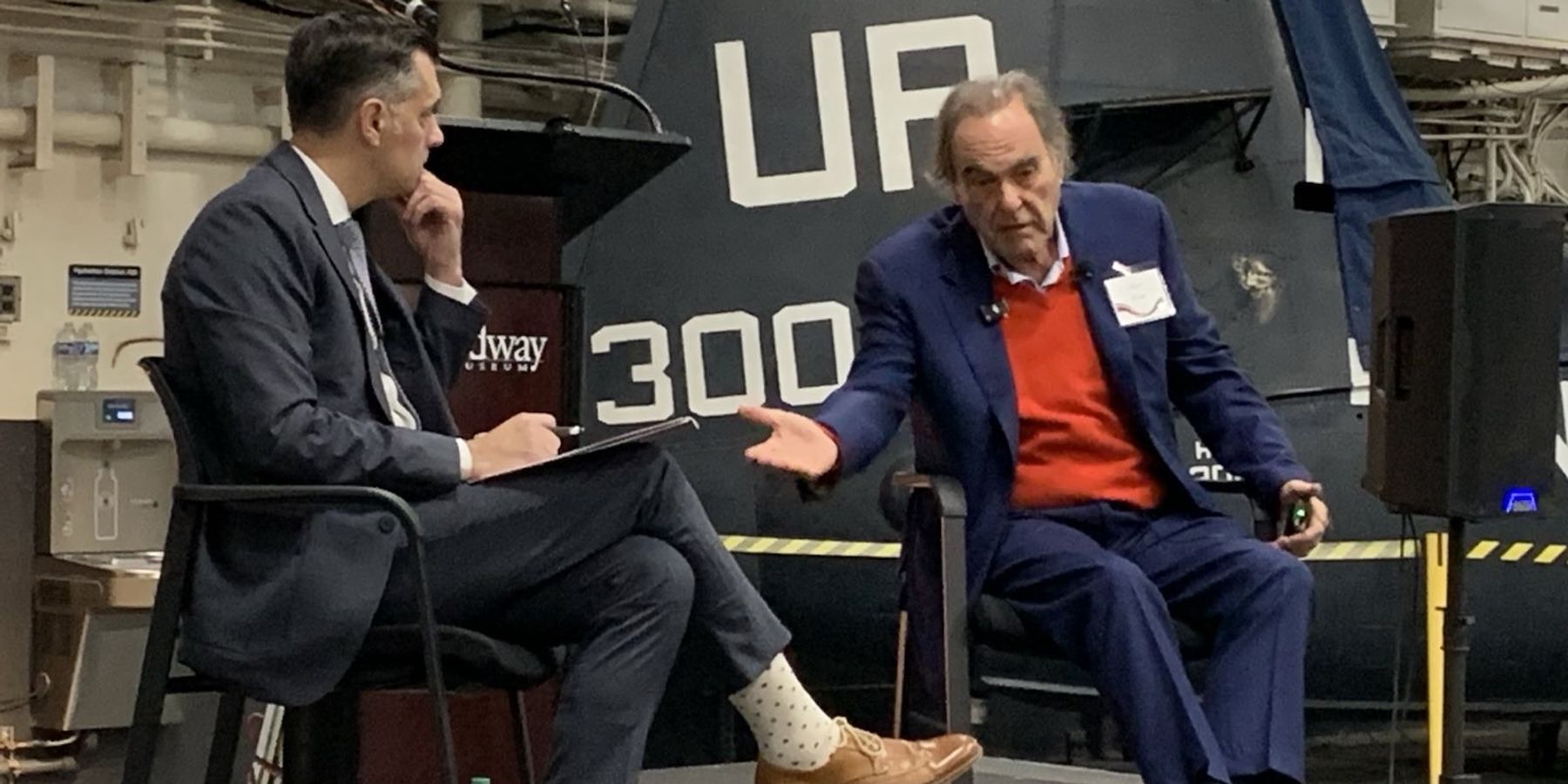SAN DIEGO — Iconic director Oliver Stone is not optimistic.
Fifty years after the end of the Vietnam War, and nearly 35 years since his film "Platoon" debuted, America is still hopelessly enamored with violence, and Washington, encouraged by the tandem power centers of Wall Street and the media, is still engineered for war.
“Our country is sabotaging itself. Why do we keep going back” in search of a necessary enemy? He asked. “We track a pattern of intervention, there is a repetition” that will eventually lead us to another world war.
Grim thoughts, given in a conversation moderated by (Ret.) Col. Greg Daddis, Iraq War veteran and director of the Center for War and Society at San Diego State University. Daddis is also USS Midway Chair in Modern U.S. Military History (Thursday’s event was held on the USS Midway museum) and a board member at the Quincy Institute, which partnered in the event.
Stone’s own experiences as a 20-year-old Army infantryman during the most tumultuous years in Vietnam (and politically, socially, back home in the U.S.) — 1967-1968 — formed the basis for Platoon, which won Oscars for Best Picture and Best Director in 1987 and is considered one of the most important and viscerally impactful Vietnam War films in Hollywood history. It is the first in his Vietnam War trilogy, which includes "Born on the Fourth of July" (1989), and "Heaven and Earth" (1993).
As a young man inspired by the tales of mythological Odysseus and a father who had served in World War II, he was driven to war by wanderlust and the frenetic unfocused energy youth. His time in combat there, in his words, took the scales from his eyes and upon returning to an “country he no longer knew” set him on a course of discovery, his mind and creativity coalescing around a burning skepticism of the government, social convention, and conformity.
This is all detailed in his excellent 2020 autobiography, “Chasing the Light” which charts Stone’s youth, his time in Vietnam, and his screenwriting/directing career though “Platoon.”
He didn’t directly mention the recent elections or the current conflict in Ukraine on Thursday night, but insisted that the “strong compulsion” to use war not only as a driver of industry but as the first tool in the box for resolving foreign disputes, still fueled Washington policy. Despite all of the failures of the last 50 years, “it’s impossible to break that lock” that war has on the collective psyche, he said. Even “Platoon” which is a searing indictment of the what he calls the Three Lies of the military and war, has failed to turn the society against interventionism.
“No film is going to change people if you don’t want to be changed,” he said, charging that military recruitment had actually gone up after the film was released.
In recent years, Stone has courted controversy with his series of interviews with Vladimir Putin and his questioning of the Washington/Western narrative of that war. The only mention he made to that was that “I have been passionately driven and for that I’ve paid a price,” and criticized censorship (his 2016 documentary "Ukraine on Fire" had been initially banned on You Tube and then reinstated).
“Free speech is a right, not a privilege” he said, to applause from the room. Of the current political dynamic, he lamented that the “neocons are here from the last administration as well as this administration, they are not going away."
“We’ve made one mistake after another on foreign affairs, there is no reason why we cannot be partners with Russia and China. We don’t need a war.”
Unfortunately, the country’s love for was is “a religion,” he said. All one can do is keep resisting it. His entire life after Vietnam seems to have sprung from that adage. “Be a rebel, and that’s the best way to be.”
- Biden's 'leadership' is blowing the lid off two wars ›
- Prolonging the Ukraine war is flirting with nuclear disaster ›
- Oliver Stone: on being 19 in war, and for a county addicted to it | Responsible Statecraft ›
















